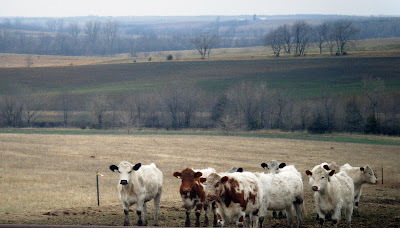 |
| Kansas Organic Farmer Jake Geiger at Family Monument in Robinson |
The fifth generation family farmer in Northeast Kansas says his widowed great-great-grandmother and her four sons immigrated in 1858. Rose Hill Cemetery, overlooking miles of fertile rolling lands, is full of Geiger family members of Germanic and Moravian descent. They'd settled in the fertile Wolf River Valley, not far from the mighty Missouri River, and discovered that the land could supply most everything they needed for sustenance.
Now Geiger has two younger generations involved in the family's USDA Certified Organic farming business. Their first certification preceded the US government's involvement in organics, when more than two decades ago they became certified with the Organic Crop Improvement Association that's now based in Lincoln, Nebraska. The extra expenses and paperwork involved with the USDA Organic seal changed little about the way the Geiger family had always farmed.
Now Geiger has two younger generations involved in the family's USDA Certified Organic farming business. Their first certification preceded the US government's involvement in organics, when more than two decades ago they became certified with the Organic Crop Improvement Association that's now based in Lincoln, Nebraska. The extra expenses and paperwork involved with the USDA Organic seal changed little about the way the Geiger family had always farmed.
 |
| American British White Cattle in foreground of Rotational Fields Planted in Clover and Alfalfa |
"Right now there's strong demand for wholesome food," said Geiger, who sells wheat to neighbors running a successful bakery. He's proud that regional demand for his products is growing and that his farm can nurture other small businesses.
When I asked about yields compared to today's industrial farming techniques, Geiger defended his methods. "We think we can produce a respectable amount by using rotational methods and legumes. The objective should not necessarily be to get the highest yield, but to get the most productive yield." He mentioned the law of diminishing returns, which he thinks is often ignored in agriculture today. He's concerned about soil and water quality, which researchers show is better with organic and sustainable growing methods. Geiger takes to heart the need for moderation in all things. This grandfather relies on old-world wisdom paired with the latest scientifically based data on sustainable farming. "I still don't discount the benefits of technological advances that have been made. I just prefer not to use toxic inputs, and we can produce just as much without using toxic inputs."
Geiger remembers about a decade ago when his college-aged son was involved with an experiment. Researchers created a small hole in his field and poured water to test infiltration. The water soaked right it, while at a nearby field using chemical inputs the soil couldn't absorb the water because of its dramatically different structure. And then there are the birds. They're often absent from neighboring farmers' fields where conventional methods might call for synthetic fertilizers, herbicides and pesticides. But Geiger enjoys listening to them on his property, especially when riding his favorite foundation quarterhorse, Hollywood Leolo.
How small farmers are seeking protection for farming and food...